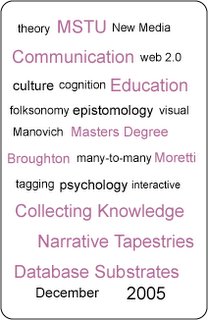December 18, 2005
Closing Thoughts on MSTU 5510
Ulises recently asked us to summarize our thoughts for the semester in our blogs. Considering that this blog was started for this class, I was surprised by my own initial resentment at being asked to post something so specific here. During the course of the semester, this forum has become a place for me to speak, not to answer. Even when I was posting assignments for class, they were items and issues which I selected and chose. This initial emotional reaction indicates how engaging these tools can become, and helped me answer some of the questions on Uilses’ list.
Its been great fun! Best of luck to everyone, and see you on Tuesday.
>> What is ‘social’ about social software?
to paraphrase: Social Software is made of people
>> How is the notion of community being redefined by social software?
>> What aspects of our humanity stand to gain or suffer as a result of our use of and reliance on social software?
Radical redefinitions of memory, identity, personal space, intimacy, and physical interaction.
>> How is social agency shared between humans and (computer) code in social software?

>> What are the social repercussions of unequal access to social software? >> What are the pedagogical implications of social software for education?
>> What are the pedagogical implications of social software for education?
>> Can social software be an effective tool for individual and social change?
See above. I think the pedagogical value of a tool follows from its potential for individual and social change.
 Filed by Jonah at 11:54 pm under Uncategorized
Filed by Jonah at 11:54 pm under Uncategorized
No Comments

 The semester is almost over, and that means its time for me to compose some thoughts. As usual, this opens more questions than it answers, but I’m pretty happy about how it turned out.
The semester is almost over, and that means its time for me to compose some thoughts. As usual, this opens more questions than it answers, but I’m pretty happy about how it turned out.